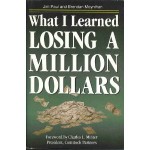October 19th, 2010 — 6:00am
A few weeks ago I heard Seth Godin say, “Someone is going to put you out of business, it might as well be you.”. He was talking about how change and innovation will put every business out of business in time. So change and innovate your own business. Make what you are doing now obsolete by doing something better, before someone else does. Fix it even if it ain’t broke, and you can beat the unsettling, inevitable decline of what you do now. I love the proactive, make-your-own-destiny attitude in this.
October 12th, 2010 — 9:33am

This book is about mistakes we make in business when we have a lot at stake emotionally. It’s a fairly short and intriguing story about the life of Jim Paul, a kid who grew up poor, became a very successful commodities trader, then lost it all. He writes with unusual humility and candidness. The mistakes he made are mistakes I could see myself making in business, so I valued the chance to learn from his experience.
I think the book is especially valuable for entrepreneurs, because it’s impossible not to have a lot at stake emotionally in a self-started business. It’s really not a book about making money, or about trading in the markets, it’s about the psychology of losing.
Here are a few key points I took from the book:
- It’s very dangerous to think you are successful because there is something a little bit special about you, that you are somehow a little bit charmed. One reason this is dangerous is because it puts your ego on the line when your success takes a downturn, and with so much ego on the line you’ll probably do expensive things to defend it.
- There’s a difference between “prophet motive” and “profit motive”. “Prophet motive” is when we are in something to prove that our prediction was right. This means if we get out, we have to admit we were wrong, which might cause us to stay in too long. He says don’t make it about being right in the first place.
- It’s essential to form a predefined exit strategy before you get into the emotional middle of a venture. “If we lose x number of dollars, we shut down the business.” “If we don’t return to profitability within x months, we’re done.” “If my investment idea loses x% I’ll abandon it.” Many people take losses much bigger than they would have been willing to allow had they written an exit strategy in advance.
This book was thought-provoking for me and I think it’s worth a read for anyone who’s in a position with something to lose and responsible for making decisions about what to do next. Here it is on Amazon.

